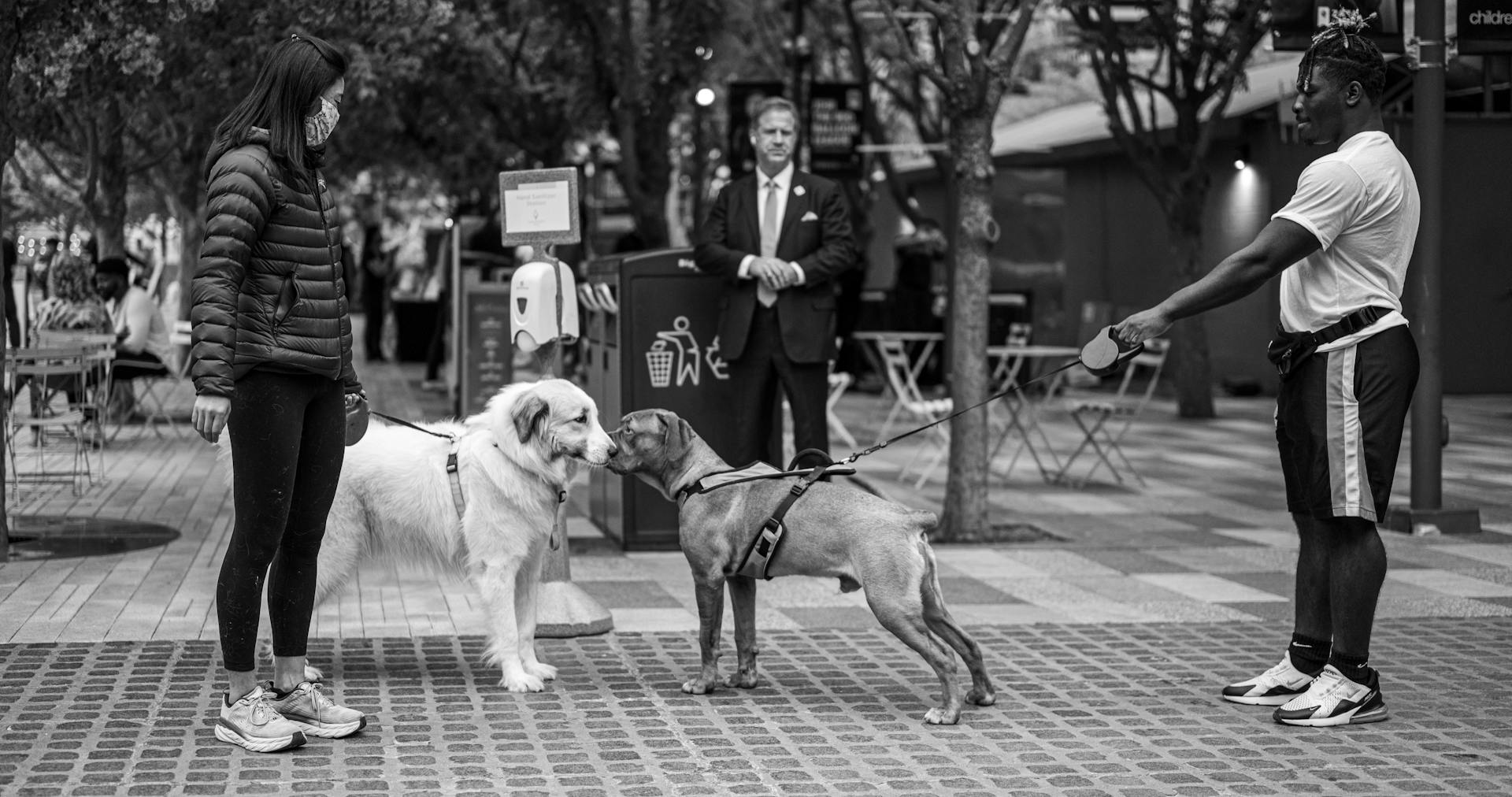
If you're considering sharing cheese with your furry friend, it's essential to know which types are safe and which ones to avoid. Hard cheeses like cheddar and Swiss are generally considered safe for dogs in moderation.
Some cheeses, however, can cause digestive issues in dogs. Soft cheeses like brie and feta contain high levels of lactose, which can lead to diarrhea and stomach cramps in dogs.
In general, it's best to introduce cheese into your dog's diet gradually to prevent digestive upset.
Can Dogs Eat Cheese?
If you're considering adding cheese to your dog's diet, it's essential to do so safely and in moderation.
Cheese should only make up 10% of your dog's diet, with the other 90% coming from a well-balanced dog food.
Treats of any kind should be kept small and infrequent to avoid upsetting your dog's digestive system.
Always choose a low-fat, low-sodium, and preferably low-lactose cheese to minimize potential health risks.
The amount of cheese a dog can handle depends on their size, so it's crucial to check the general portion sizes for each breed size.
Here's a quick guide to help you determine the right amount of cheese for your furry friend:
- Extra-small dog (2-20 pounds): one or two pieces (½-inch wide by ¼-inch thick)
- Small dog (21-30 pounds): two to three pieces (1 inch wide by ¼-inch thick)
- Medium dog (31-50 pounds): five to six pieces (1 inch wide by ¼-inch thick)
- Large or extra-large dog (51+ pounds): five to six pieces (1 inch wide by ¼-inch thick)
Lactose and Milk Allergies
Some pups are lactose intolerant, meaning they can't digest lactose, a sugar found in milk and dairy products. This can lead to loose stool and bad gas. Lactose intolerance can be mild or severe, and it's usually because they don't produce the enzyme lactase, which breaks down lactose.
Others might be allergic to the proteins in milk, which can cause an allergic reaction to cheese. If you're considering giving your pup cheese for the first time, start with a small amount and watch for any signs of an allergic reaction.
If your pup is lactose intolerant or allergic to milk, it's best to avoid giving them cheese altogether. If you do decide to give them cheese, be cautious and monitor their reaction closely.
Safely Feeding Your Dog
If you're considering adding cheese to your dog's diet, it's essential to do so safely. Treats of any kind should only make up 10% of your dog's diet, and cheese should be low-fat, low-sodium, and preferably low-lactose.
To determine the right amount of cheese for your dog, check their breed size. Extra-small dogs (2-20 pounds) can handle one or two small pieces, while small dogs (21-30 pounds) can have two to three pieces. Medium dogs (31-50 pounds) can have five to six pieces, and large or extra-large dogs (51+ pounds) can also have five to six pieces.
Feeding cheese to your dog can have risks, such as digestive troubles for lactose intolerant dogs and obesity from high-fat content. It's also crucial not to use cheese as a treat replacement, as this can lead to overfeeding and nutrient imbalances.
Here are some serving ideas to consider with your vet's approval:
- Provide a small quantity of cottage cheese on its own or add some to your pup's usual food serving.
- Combine equal parts of cooked white rice and cottage cheese to relieve your dog's sensitive stomach.
- Use cheese to conceal medication or to liven up prescription food. Be sure to check with your veterinarian first.
- Give small bits of mozzarella or cheddar when training your pup or as an occasional reward.
- Create a cheese sauce and pour a very small amount of it over harder dog foods like kibble.
If you have any questions about adding cheese to your dog's diet, always consult with your vet.
Types of Cheese to Avoid
Some cheeses are better left untouched by our furry friends. Blue cheese, for instance, is a no-go due to the mould used in its production, which can cause diarrhea and vomiting in dogs.
Feta and Roquefort cheeses are also off-limits. They contain high levels of roquefortine, a substance that's poisonous to dogs and can lead to vomiting, diarrhea, and other neurological symptoms.
If you're looking for a list of cheeses to avoid, here's a quick rundown: Blue CheeseFeta CheeseRoquefort Cheese
Can Blue Cheese
Blue cheese is a type of cheese that's best avoided for our furry friends. The high-fat content is just the beginning of the problem.
The actual mould used in blue cheese production is what poses a real risk to dogs. This mould can cause digestive issues if ingested.
Dogs lack the enzymes necessary to digest blue cheese, making it difficult for them to process. This can lead to unpleasant symptoms like diarrhea and vomiting.
It's always better to err on the side of caution and keep blue cheese out of reach of our canine companions.
Can Swiss Cheese

Can Swiss Cheese be a part of your diet? It's actually quite high in calories, with a single ounce containing around 115 calories.
The fat content in Swiss cheese is also a concern, with a significant portion of it being saturated fat. In fact, a 1-ounce serving of Swiss cheese contains about 8 grams of fat.
This can be a problem for those watching their weight or managing high cholesterol.
Types to Avoid
Blue cheese is a no-go for your furry friend, due to its high-fat content and the mould used in its production, which can cause diarrhea and vomiting in dogs.
Some cheeses are just too rich for your dog's sensitive stomach, like Feta and Roquefort. These cheeses contain roquefortine, a toxin that can lead to serious health issues in dogs.
Here are some cheeses you should never feed your dog: Blue CheeseFeta CheeseRoquefort Cheese
Dogs with lactose intolerance may struggle with digestion, and some breeds are more at risk than others. If you're unsure about your dog's cheese tolerance, it's always best to consult with your vet.
Some breeds to be particularly cautious with cheese include the Bulldog, Shih Tzu, Poodle, and Boxer.
General Information
Dogs have a highly developed sense of smell, which they use to detect the aroma of cheese.
Cheese is a type of dairy product made from the proteins and fats in milk, which can be found in most supermarkets.
Many dogs love the taste of cheese, but it's not a necessary part of their diet.
A standard serving size of cheese is about 1 ounce, or the size of a small dog treat.
Frequently Asked Questions
Why do dogs love cheese?
Dogs are drawn to cheese due to its strong, savory aroma and rich flavor, as well as its high fat and protein content. This combination makes cheese a highly palatable treat for many canine companions.
Sources
- https://www.petmd.com/dog/nutrition/can-dogs-eat-cheese
- https://www.bestbullysticks.com/blogs/bbs-blog/can-dogs-eat-cheese-what-to-know-and-what-to-avoid
- https://www.pawlicy.com/blog/can-dogs-eat-cheese/
- https://basepaws.com/dog-insider/can-dogs-eat-cheese
- https://www.frankielovesbarkery.com.au/types-cheese-safe-allowed-dogs/
Featured Images: pexels.com


